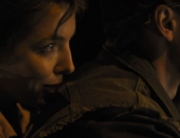This neonoir will not surprise you. That’s not a criticism. In fact, that very predictability is central to the film’s success.
Toby (Chris Pine), a deadbeat Texan with little more than a derelict and a soon-to-be foreclosed farm to his name, is a man with few options. When his brother, Tanner (Ben Foster), is released from prison, the two resolve to escape the mire of poverty the only way they know how: robbing small-town banks to pay off the mortgage. At first, the pair is wildly successful, taking away gobs of untraceable cash with modest, well-planned heists. But as Sheriff Marcus Hamilton (Jeff Bridges at his jowliest) catches their scent, and Tanner proves to be more and more of a madcap, a sense of impending doom grows.
Hell or High Water uses well-worn crime film tropes to strengthen this sense of inevitability. Toby and Tanner, the smooth criminal and the loose cannon, evoke Butch Cassidy and the Sundance Kid and many other ill-fated criminal pairs. Even the brothers seem to realize that there’s only one way this can end: “I never met nobody got away with anything,” Tanner says in a rare moment of sobriety. Marcus, too, is an immediately recognizable archetype, the lonely cop on his last case before retirement, a man with nothing to lose. He also seems aware that he might not live long enough to receive his pension, despite how close he is to his retirement date.
This notion of looming disaster pervades the film, lending even slow scenes a thick tension, such as Marcus’s stakeout with his laconic Mexican-Comanche partner, Alberto (Gil Birmingham). This is not a movie that relies on action set pieces to get your heart racing. All it needs is a wild glint in Tanner’s eye as he strays from his brother’s plan.
Though those central four characters are rock solid, the film weakens when it takes the camera off of them. The few speaking women, for example, are victims and scolds; Toby’s ex-wife, Debbie (Marin Ireland), simply exists to pressure Toby for child support. But that might be forgiven, as the vast majority of the film follows the men’s toxic masculinity with sharp focus.
Hell also excels at showing the odd bonds between the two pairs of men. Toby and Tanner could not be more different, but Foster and Pine adeptly convey the brothers’ need for each other and their respect for the other in spite of the brother’s failings. Meanwhile, Marcus is constantly trying to pull Alberto out of his shell but finds that slinging casual racism (poking at Native American drinking habits) is a poor strategy.
In one of the final scenes, a rattlesnake curls around a dead man’s boot. Ultimately, it doesn’t matter whether the victim had been shot or not: there’s no dodging the reaper.







Leave A Comment